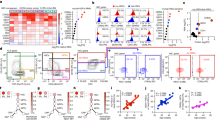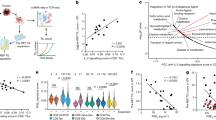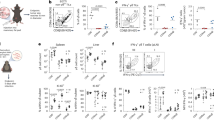Abstract
The immunological mechanisms responsible for overcoming infections with Babesia, an intra-erythrocytic protozoan, are not fully understood. Although high titres of specific anti-babesial antibodies have been observed in several species of animals1, and protection has been obtained by transfer of large volumes of recovery serum2, the role of antibody in the immune response to an infection is uncertain. The present study investigates the nature of B-cell participation during Babesia microti infections by observing the course of the disease in mice in which IgM production has been suppressed from birth and which contain no B cells. The results show that, in contrast to control mice, which develop and subsequently clear circulating parasitaemias, suppressed mice show an unexpected resistance to infection as reflected by a virtual absence of parasites in the peripheral circulation.
This is a preview of subscription content, access via your institution
Access options
Subscribe to this journal
Receive 51 print issues and online access
$199.00 per year
only $3.90 per issue
Buy this article
- Purchase on Springer Link
- Instant access to full article PDF
Prices may be subject to local taxes which are calculated during checkout
Similar content being viewed by others
References
Ristic, M. in Immunity to Parasitic Animals Vol. 2 (eds Jackson, G. J., Herman, R. & Singer, I.) 831–870 (Appleton-Century-Crofts, New York, 1970).
Mahoney, D. F. Expl Parasit. 20, 119–124 (1967).
Lawton, A. R. III, Asofsky, R., Hylton, M. P. & Cooper, M. D. J. exp. Med. 135, 277–297 (1972).
Cox, F. E. G. Bull. Wld Hlth Org. 43, 325–336 (1970).
Norman, B. B., Johnson, R. R. & Jones, E. W. Fedn Proc. 24, 2544 (abstr.) (1970).
Aoka, N. & Vowkvalla, K. T. Proc. Soc. exp. Biol. Med. 130, 101– (1969).
Chapmen, W. E. & Ward, P. A. Science 196, 67–69 (1977).
Rothman, I. K., Gelfand, J. A., Fauci, A. S. & Frank, M. J. Immun. 115, 1312–1315 (1975).
Cox, K. O., Howard, R. J. & Mitchell, G. F. Cell. Immun. 32, 223–227 (1977).
Rosenberg, Y. J. Nature 274, 170–172 (1978).
Eugui, E. M. & Allison, A. C. Bull. Wld Hlth Org. (in the press).
Djeu, J. Y., Heinbaugh, J. A., Holden, H. T. & Herberman, R. B. J. Immun. 122, 175–181 (1979).
Weinbaum, F. I., Evans, C. B. & Tigelaar, R. E. J. Immun. 117, 1999–2005 (1976).
Clark, I. A. & Allison, A. C. Nature 252, 328–329 (1974).
Callow, L. L. in Immunity to Blood Parasites of Animals and Man (eds Miller, L. H., Pino, J. A. & McKelvey, J. J. Jr) 121–149 (Plenum, New York, 1977).
Author information
Authors and Affiliations
Rights and permissions
About this article
Cite this article
Rosenberg, Y., Evans, C. Resistance of mice suppressed for IgM production to Babesia microti infection. Nature 281, 302–304 (1979). https://doi.org/10.1038/281302a0
Received:
Accepted:
Issue Date:
DOI: https://doi.org/10.1038/281302a0
Comments
By submitting a comment you agree to abide by our Terms and Community Guidelines. If you find something abusive or that does not comply with our terms or guidelines please flag it as inappropriate.



